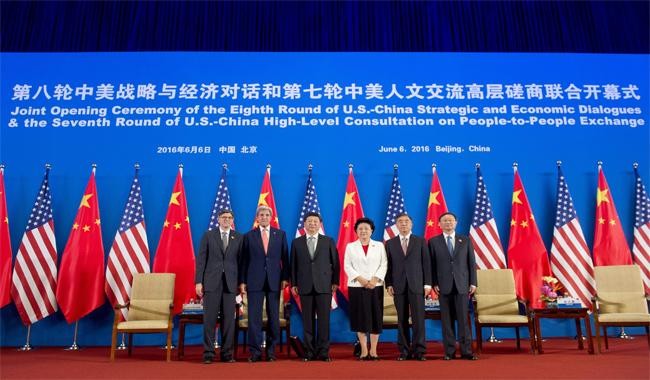
Wall Street Journal reports that China pushed back strongly against U.S. criticism of its stance on maritime disputes as the two sides prepared for economic and security talks expected to be dominated by tensions over the South China Sea. The dialogue, beginning Monday in Beijing, takes place with China bracing against growing international pressure over its territorial claims and asserting its intent to exercise greater clout as a major power. Economic strains between Beijing and Washington, meanwhile, have flared over currency and trade practices. The intent of the high-level talks, which President Barack Obama launched in 2009, is to try to find common ground. U.S. officials, for instance, have said they would seek Beijing's help in pressuring North Korea over its nuclear program. Last week, though, Washington took additional steps to cut off Pyongyang from the global financial system—a move that could expose China, North Korea's largest trading partner, to negative economic effects.
- Reuters reports that China has promised to implement measures to improve laws and government services for businesses in response to slowing private investment growth, state media reported late on Saturday. China is counting on the private sector to invest more in the economy as the government tries to shift away from state-run heavy industry to a more entrepreneurial and services-led growth. The measures come after a month-long survey of hundreds of private companies, the official Xinhua news agency reported, without detailing the measures.The study found smaller market demand, overcapacity, higher labor costs and bad policy implementation had contributed to slower investment growth, Xinhua reported.
Wall Street Journal reports that a flood of foreign undergraduates on America's campuses is improving the financial health of universities. It also sometimes clashes with a fundamental value of U.S. scholarship: academic integrity.
A Wall Street Journal analysis of data from more than a dozen large U.S. public universities found that in the 2014-15 school year, the schools recorded 5.1 reports of alleged cheating for every 100 international students. They recorded one such report per 100 domestic students. Students from China were singled out by many faculty members interviewed. "Cheating among Chinese students, especially those with poor language skills, is a huge problem," said Beth Mitchneck, a University of Arizona professor of geography and development.Faculty and domestic students interviewed said it appears that substantial numbers of international students either don't comprehend or don't accept U.S. standards of academic integrity.
- 2016-06-03 U.S. to Urge China to Put More Pressure on North Korea
- 2016-06-02 China tells U.S., don't let allies set South China Sea policy
- 2016-06-01 President Trump would hand the world to China
- 2016-05-31 China to 'pressure' U.S. on maritime issues, paper says
- 2016-05-30 For many Chinese migrants, the lure of the city is fading
- 2016-05-29 China Default Chain Reaction Threatens Products Worth 35% of GDP
- 2016-05-27 G-7 leaders express concern over South China Sea, urge peace
- 2016-05-27 G-7 leaders express concern over South China Sea, urge peace
- 2016-05-26 China warns G7 not to ‘escalate tensions’ in Asia
- 2016-05-25 On the Agenda But Off Guest List, China Eyes G-7 in Japan
- Bloomberg China Must Become 'More Adept' at Policy Communication, Lew Says
- The Washington Post US military wants India to counterbalance China's rise as a sea power
- The Hill Trade lawmakers urge US to take tough stance with China
- Bloomberg France to Push for Coordinated EU Patrols in South China Sea
- Reuters Diplomatic tag as countries find new ways of standing up to China
- CNN 'We have no fear of trouble': China talks tough over South China Sea
- blogs.wsj.com Kerry Pulls Strings in Mongolia Ahead of Taut Talks in China
- Financial Times China and US trade barbs over South China Sea
- Fox News China pushes back against US pressure, says it has 'no fear of trouble' in South China Sea
- Reuters China says it hopes for counter-terror intelligence sharing with France
- Reuters As Inter deal nears, Chinese retail giant Suning eyes soccer empire
- Forbes Big Investors Dumping China Icons Alibaba And Lenovo
- New York Times Kerry Cautions China on Actions in South China Sea
- Financial Times Xi's policies are neither radical nor riskier
- Bloomberg China's Factory to the World Is in a Race to Survive
- New York Times Business Day|US to Press China to Curb Industrial Output
- The Diplomat Sustainably Affordable Health Care in China
- Wall Street Journal US-China Talks Set to Open With Fresh Concerns Over Beijing's Sea Claims
- Wall Street Journal Chinese Firms Rush Into Global Deals, and Face Some Push-Back
- Reuters On southwestern fringe, China's Silk Road ambitions face obstacles
- blogs.wsj.com Nine-Dash Line's Ambiguity a Good Thing, Argues Chinese Military Academic
